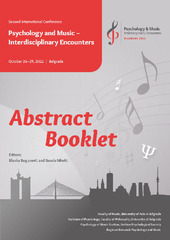Приказ основних података о документу
Important factors for the development of musically gifted students: A study of music school teachers in Serbia
| dc.creator | Martinović, Vanjuška | |
| dc.creator | Rokvić, Vesna | |
| dc.creator | Stekić, Katarina | |
| dc.date.accessioned | 2023-10-11T09:27:49Z | |
| dc.date.available | 2023-10-11T09:27:49Z | |
| dc.date.issued | 2022 | |
| dc.identifier.isbn | 978-86-81340-59-2 | |
| dc.identifier.uri | http://reff.f.bg.ac.rs/handle/123456789/4953 | |
| dc.description.abstract | Teachers in music schools commonly work with musically gifted students (Bogunović, 2006, 2007). However, there are not many tools nor guides to help teachers work with gifted students and unlock their full potential (Bogunović, 2010; Bogunović et al., 2011; Mirković Radoš, 2010). The aim of this study was to investigate which factors music teachers identify as important in working with musically gifted students. Teachers from 2 music schools in Serbia (N = 101, M = 14.94, SD = 10.11 years of service) filled out a questionnaire during their working hours. The questionnaire consisted of five checkbox questions, three multiple choices, and one open-ended question. All participants were surveyed on their opinions and experience working with gifted students, while 69.3% reported having experience working with gifted students. Both individual class teachers (N = 79) and group class teachers (N = 22) participated. Descriptive statistics show that music teachers believe the most important support measures in working with musically gifted students are teacher-parent collaboration (79%), additional classes (74.3%), and creating a stimulating school atmosphere (64%). Stability and serenity (91.1%), stable and harmonious family relations (86.1%) and cooperation with the teacher (81.2%) are recognized as the most important factors regarding the gifted students’ parents. Work dedication (99%), expertise (95.1%), the ability to transfer knowledge (94.1%) and a personalized approach (90.1%) are identified as the most important factors regarding the teachers’ role in the success of the gifted student. A gifted student’s most important personality traits are pitch, musicality, work habits, responsibility and discipline, stability, intelligence, good organization, strong motivation, independence, and originality. More than 90% of teachers mentioned each of these traits. Group differences were analzyed with independent sample t-tests and chi-square tests. Group class teachers factor in ambition and independence significantly more than individual class teachers. They tend to believe more often that particular methods are necessary when working with gifted children. Group class teachers also pay more significance to factors such as parent-teacher cooperation, stable and harmonious family relations, and a personalized approach to gifted children. Although, in practice, music teachers of individual and group classes seem to commonly misalign in their attitudes towards working with gifted children, this study has shown that they mostly agree on the important factors that can lead a gifted child to become a successful musician. The generalization of these results should be limited to music teachers who teach in Serbian music schools. | sr |
| dc.language.iso | en | sr |
| dc.rights | openAccess | sr |
| dc.rights.uri | https://creativecommons.org/licenses/by/4.0/ | |
| dc.source | Abstract booklet - Second International Conference Psychology and Music – Interdisciplinary Encounters, October 26–29, Belgrade | sr |
| dc.subject | music teachers | sr |
| dc.subject | musically gifted students | sr |
| dc.subject | musicality | sr |
| dc.subject | success factors | sr |
| dc.title | Important factors for the development of musically gifted students: A study of music school teachers in Serbia | sr |
| dc.type | conferenceObject | sr |
| dc.rights.license | BY | sr |
| dc.identifier.fulltext | http://reff.f.bg.ac.rs/bitstream/id/12158/ab_pam-ie-belgrade-2022.pdf | |
| dc.identifier.rcub | https://hdl.handle.net/21.15107/rcub_reff_4953 | |
| dc.type.version | publishedVersion | sr |

